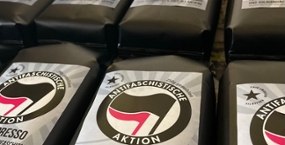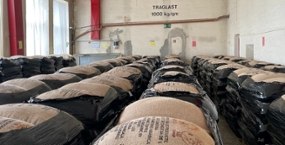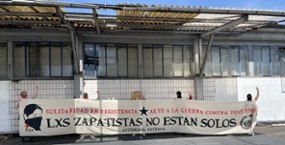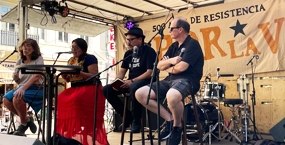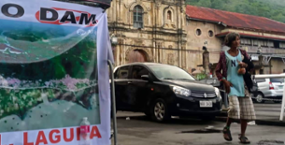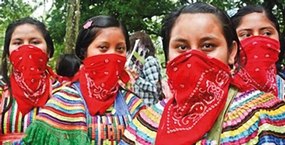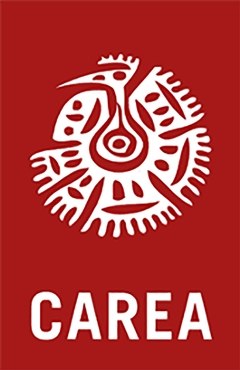Who are the Zapatistas and how are they organising?
Zapatism and rebellious communities
Zapatistas are rebellious indigenous people and communities in Mexico. They have adopted the name and the slogan 'Tierra y Libertad' demanding land and freedom of revolutionary hero Emiliano Zapata (1879-1919). In his name, they are fighting oppression, land seizure, capitalist conditions, neo-liberalism and the free trade agreement NAFTA and its consequences in particular.[1]. They are organised in EZLN (Ejército Zapatista de Liberación Nacional), the Zapatista Liberation Army, and in five so-called Caracoles, regional assemblies and councils in the communities.
When free trade agreement NAFTA came into effect, import taxes for nearly all agricultural projects were abolished, resulting in the foreseeable effect of Mexico being swamped by cheap US products. Ever since Mexican small-scale farmers are competing without a chance with US major landowners and farming industries. Their livelihood has been destroyed which had been conceivable even before the agreement: 'with NAFTA, they will kill us without bullets.'[2]
Armed rebellion sporting the famous balaclavas took place on 01/01/1994, the day of NAFTA coming into effect, after more than ten years of underground preparation and decades of struggle for acceptance and land. They described the taking up arms as a 'means of desperation' [3] and as an 'uprising of dignity'. Following the slogan 'Ya basta!' ('Enough!'), five cities were squatted.
Violence, corruption and lawlessness in Mexico
For twelve days the EZLN was defending against attacks by the military and the police. The government sent 17 000 soldiers to defeat the uprising by military means. The Mexican population showed solidarity with the Zapatista demands and held big demonstrations all over the country. The PRI, in power since 1929 in the style of a single political party, was finally forced to proclaim a truce followed by the ending of EZLN's armed resistance, in effect until today. Due to government parties' paramilitary forces, the context of organised crime and to this day massive presence of the military, there is frequent occurrence of assaults, murders and crimes against human rights.
Violence all over Mexico is illustrated by a figure: on a national level currently 30 000 people are supposed to have vanished – more than during the dictatorships in Chile and Argentina. Corruption is prevalent and local police are cooperating with drug cartels more often than not. Murders of women are happening so frequently that there is a special name - they are called feminicidos. Well-known community and union activists and last but not least journalists reporting this situation are killed on a regular basis.
Changing the world without assuming government power
Zapatista political demands are reaching far beyond resistance against the NAFTA agreement. One popular slogan being 'All for everyone – for us nothing!' summing up the struggle and the demands: radical social equality. Privileges regarding access to resources are renounced, consequently even including for oneself. Fighting does not focus on individual identity-related groups but is for the benefit of all. Rallying for an anti-state and anti-hierarchical concept, Zapatistas differ greatly from traditional liberation movements defined by their reference to parts of the (national) territory. Respectively they don't demand national liberation or independence but autonomy and self-administration as a local base for global change.
Zapatistas perceive themselves as part of global relations, of a 'capitalist Hydra' to be changed. According to Marcos, this is required because the '4th World War' [4] has already begun, accumulating poverty by neo-liberalism concerning the entire world. In their struggle against this war, they are not acting as an armed party of this conflict and are not pursuing civil war but are organising self-defence against the ubiquitous violence, thereby relating to the population's interests and needs and targeting international networking. Hence, two international assemblies (1996/97) welcoming thousands of activists and left-wing intellectuals have been held, providing substantial impulses to the globalisation-critical movement.
The Zapatista movement's objective is aspiring to bring about a change of society without assuming governmental power. The emphasis is on a thorough overthrow of society and on women's liberation. It doesn't attempt to conquer and seize state structures but is creating grass-roots democratic alternatives.
'With questions, we are moving forward' – Zapatista self-organisation
Following negotiations between the Mexican government and EZLN, the San Andres Agreement regarding rights and culture of the country's 62 indigenous population groups was signed in 1996. This agreement as well as land reform according to the Mexican revolution's constitution has never been put into practice. Paper is patient as the saying goes, but due to their experiences Zapatistas weren't to be put off until eternity. Unilaterally and without the government's consent, they began to implement the agreement's spirit in the communities.
As a consequence of the rebellion, up to 30 counties were governed autonomously and civil construction of an alternative economy in the communities was undertaken spiritedly. Autonomously governed regions are structured into five Caracoles (snail shells, meaning also centres) acting more or less independently of each other. Surrounding Municipios (counties) are assigned to the respective Caracoles. Caracoles are working as communication and logistics centres of the respective regions. Frequently there is infrastructure for international guests providing space for mutual exchange.
Additionally, there are collective shops, workshops, cultural institutions and occasionally secondary schools and health stations. Moreover, the Junta de Buen Gobierno (council of good government) is assembling in the Caracoles, deciding their respective region's fate democratically. The Junta consists of elected community members from the municipios. All elected representatives are subject to the principle of obeying government: if the communities are not served satisfactorily or if unaccountable action occurs, persons can be removed from office immediately. Furthermore, all representatives are rotating regularly. This is supposed to result in as many people as possible having knowledge of the self-administration and simultaneously in preventing corruption and abuse of power.
'Here, the government is obeying and the population is governing' – grass-roots democracy as a principle
Besides junta meetings, there are general assemblies of communities deciding important issues of community life. This also applies to EZLN issues. This ensures all decisions being made in accordance with the basis.
Grass-roots democratic approach and practical testing of autonomous political organisation require much time and patience (political centres being called snail shells is no coincidence). The motto 'With questions, we are moving forward' is illustrating the approach and practice of reflection and questioning of their own political practice.
Yet, numerous achievements and enhancement of the social situation in general have been accomplished due to this practice. Hospitals, community centres and an educational system operating schools in nearly all communities have been established. The level of education, alphabetisation and the population's health have increased significantly. Additionally, the region has suffered far less from crime than other parts of the country. Furthermore, women are occupying crucial positions in community administration and EZLN organisation. There are special education and information campaigns. Women's collectives have been organising workshops and in March 2018 have called for an international network meeting of and for women, lesbians and transgender fighting under different conditions for their rights all over the world.
Significance for anti-globalisation and post-colonial movements
The Zapatista struggle being able to gain that much influence and standing its ground until today in spite of the military's overwhelming power is quite astonishing. John Holloway is dubbing the Zapatista movement as 'absurd' a positive way because it is backed by the poorest and most disadvantaged and discriminated population stratum in Mexico.
Their attempt to implement emancipatory ideas practically and to locate one's own conditions globally granted international connectivity to the Zapatistas and developed a wide base of supporters. In this perspective, there are global processes of exploitation logic concerning all people in a specific way but it is not possible to oppose this logic with equal force and similar action at all locations. Therefore, it is required to develop own approaches and perspectives and to fight local struggles without losing sight of global contexts. To create the world anew in the spirit of emancipation and to fight for the not-yet presently.
Additionally, Zapatism presents a fruitful point of reference for movements beyond party policy, particularly due to its strength to understand critical self-questioning as an essential part of the struggle. In the summer of 2005, the 'Other Campaign' was initiated. This association of temporarily more than 1000 organisations was supposed to create a 'really left-wing' anti-capitalist alternative by long-term bottom-up mobilisation 'for the base' and opposed to party policy and parliamentarianism.
In 2017, indigenous activist Marichuy was nominated as presidential candidate by EZLN and CRI, a nation-wide council of the indigenous population. This candidacy was not about winning the elections but was supposed to illustrate the threefold impossibility of a poor, indigenous and female person becoming president according to the Mexican society's imagination and to expose the underlying racism and sexism. 'There has never been any change for indigenous people, no matter whether right- or left-wing politicians have been in power.' was proclaimed in one statement. Therefore, there was neither a manifesto nor a party backing the candidacy. Marichuy has always emphasised that the only institution she is representing is consisting of 130 representatives from communities, town quarters and indigenous peoples: 'They have elected me because the entire collective cannot run for election'. Many of her speeches and statements have been composed and adopted by consensus in the communities.
In a meeting at Mexico City university she declared that, had indigenous people had the idea to nominate a presidential candidate ten years ago, probably Subcomandante Marcos would have taken the stage. But nowadays the world-famous iconic Zapatista speaker is a normal member of his community and, however, Marichuy has been an activist in solidarity with the Zapatistas from the very beginning. It's not a coincidence that, in the face of assaults and attacks, she was exclusively accompanied by women: 'Don't doubt it: Women's time has come and we are going all out', she was proclaiming, given women's murders and racism still prevailing in Mexican society. In March 2018, after the candidacy campaign, the first international meeting of fighting women has taken place in the indigenous Zapatista communities. Development of extra-parliamentary movements and of the communities' autonomy, as well as the creation of solidarity networks questioning and learning from each other, still remains the base of the Zapatista uprising of dignity.
[1] North American Free Trade Agreement between Canada, the US and Mexico
[2] Subcomandante Marcos in: Marta Durán de Huerta (1994/2001): Yo Marcos. Gespräche über die zapatistische Bewegung, p. 94
[3] ibid., p. 48
[4] Subcomandante Marcos (1997): „Der vierte Weltkrieg hat bereits begonnen“. In: Le Monde Diplomatique (German edition)

